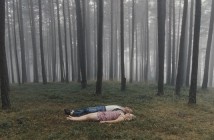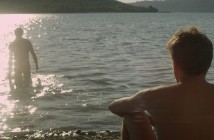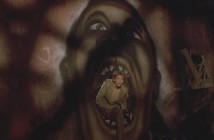Where last week’s lacklustre assortment of cheap horrors, disposable dramas, and facile comedies left me struggling to decide on a film of the week I could even imagine ever watching again, this week sees us flooded with a sea of quality, a vast ocean of cinematic excellence to dive into. Don’t get me wrong: herein you’ll find a few clunkers, but for the most part this week’s crop is great news for Netflix subscribers. It’s hardly surprising that there should be so many good things to check out though; with in excess of 150 titles released over the last seven days, there’s sure to be a plentiful supply of good viewing material. As ever the need to eat and sleep has stood in the way of full coverage, but I’ve managed to work my way through 35 of the latest titles, 17 of which are presented below for your pleasure. Expect the remaining 18 tomorrow, I’m sure you won’t have run out before then.

Watch it here
Boasting what might well be the defining performance of Harvey Keitel’s career, Abel Ferrara’s 1992 cop drama is a dark descent into the recesses of the human soul, a twisted journey through personal destruction and the faintest hints of redemption buried in a vast cesspool of sin. Bearing all—emotionally and physically—Keitel fills the titular drug-addled role with magnificent intensity, commanding the audience’s gaze with a terrifying tension that screams of inner agony. His nameless lieutenant finds himself deeper and deeper in gambling debt as he investigates the rape of a nun in a church. He is not unlike Travis Bickle, though removed of the idealism whereby he might cleanse the swarming evil of New York city; instead it has swallowed him, and he it, becoming one with the black void. Ferrara’s powerful religious and sexual imagery enshrouds this potent tale of distressing hopelessness, filling the screen with the potent sadness of this man lost to the world. HIGHLY RECOMMENDED.

Watch it here
Released just a year before director Gene Saks and writer Neil Simon’s iconic comedy The Odd Couple, this first collaboration between the two shares the same ideas of domestic tension, beginning with the marriage of loving young couple Corie and Paul. Played by Robert Redford and Jane Fonda, they are characters that perfectly embody the shifting mores of Hollywood at the time, spending the film’s first 20 minutes bedding each other with the kind of frivolous fervour the recently abolished Hays’ Code had seen studio films deprived of for decades. The decrepit state of the newlyweds’ new home is the source of much comedy, smashed skylights and malfunctioning radiators as much a problem as the sexually-charged whims of an eccentric neighbour perfectly portrayed by Charles Boyer. Much like The Odd Couple though, what sticks in mind about Barefoot in the Park is not the hilarity of the script, but the sense of drama hidden beneath the unending wave of comic gold. RECOMMENDED.

Watch it here
Debuting when the studio system was still at the height of its power with 1957’s 12 Angry Men, Sidney Lumet remained until his death a director astonishingly well-equipped to adapt to any story he wished to tell in the vein of classic Hollywood’s finest minds. His five decade career saw him tackle everything from dark drama to straight comedy, musicals to gangster pictures. Demonstrating at 83 the same narrative vivacity and dramatic depth as he had with his debut 50 years prior, Lumet could hardly have bowed out in a finer way than with Before the Devil Knows You’re Dead, a film that deserves to be held up alongside the greatest works of his masterpiece-studded career. Drawing phenomenal work from Philip Seymour Hoffman, Ethan Hawke, and Albert Finney, Lumet once more displays his incredible acuity as an actors’ director, crafting a film with the raw emotional energy a man quarter of his age would struggle to amass. HIGHLY RECOMMENDED.

Watch it here
Another director whose talents have not waned in his ninth decade, Clint Eastwood has reached a new level of prolificacy since the turn of the millennium, firing out incredible works the like of Mystic River, Million Dollar Baby, and Letters from Iwo Jima alongside undervalued human dramas such as Hereafter and J. Edgar. It’s a shame, then, to have to say that his work since 2000 has not been devoid of bad choices, 2002’s Blood Work easily standing among the director’s very worst films since his 1971 debut. Seeing Clint himself don the mantle of an aging detective guided in his search for a serial killer by having—quite literally—the heart of a woman, it’s a trite thriller weighed down by unsurprising twists and a story so silly and formulaic it’s almost painful to watch. Only outdone in the canon of Eastwood stinkers by The Eiger Sanction and The Rookie, it’s a hideous outing best left forgotten. AVOID IT.

Watch it here
A stirring social drama for which writer/director John Singleton became both the first ever African American to be nominated for the Best Director Oscar and the youngest nominee, Boyz n the Hood begins with the statistic that one in every 21 black American males will be murdered and proceeds to examine the psychological and social implications of such a damning prognosis. An astute performance from Cuba Gooding Jr as 17 year old do-gooder Tre is matched in its effect by Laurence Fishburne as the father determined to keep his son out of trouble. Singleton’s is a powerful film that draws you to like even the more criminally-inclined of its characters as it moves toward an inevitably tragic crescendo, carrying a worrying feeling of impending tragedy all the way. Fine supporting work from Ice Cube and Morris Chestnut as a pair of brothers who best embody the two sides of the coin beautifully completes the thematic arc of a sadly accurate social portrait. RECOMMENDED.

Watch it here
One of Woody Allen’s most well-remembered comic outings, Broadway Danny Rose marked Allen and cinematographer Gordon Willis’ fourth black and white collaboration, and comes fully soaked in the gorgeous monochrome that made Manhattan so visually splendorous an experience. Allen plays the titular talent manager who, eager to motivate his one promising client to perform at an important show, pretends to be in a relationship with his girlfriend in order to distract her gangster ex-boyfriend. Mia Farrow is near unrecognisable as the sneering socialite girlfriend with whom Danny goes on the run, leading to shenanigans aplenty as they humourously flee the murderous rage of said jealous gangster. Just Allen and Farrow’s third collaboration, it’s a film replete in their fantastic on-screen chemistry, the scenes with them simply driving along together talking the finest it has to offer. One of the most even balances of silly sensibility and deeper dramatic connotations of Allen’s filmography, it’s a very fine piece of work indeed. RECOMMENDED.

Watch it here
It’s a wonderful thing that Jack Cardiff was still alive to participate in this career retrospective, during the production of which he passed away. He is doubtlessly the most animated and informative of the many interviewees who join together to heap praise on the cinematographer’s storied career, his every word on the subject of cinema spiked with the energy of a man truly in love with what he does. From his pioneering colour photography in the films of Powell and Pressburger to his own directorial career to later action film work in Conan the Barbarian and Rambo: First Blood Part II, Cameraman: The Life and Work of Jack Cardiff traces the indomitable legacy of one of the most important DPs in the history of film. With interviewees including Lauren Bacall, Kirk Douglas, and Martin Scorsese, it’s a richly informative documentary that gives a comprehensive look at Cardiff’s work, going behind the scenes to examine his most innovative shots. RECOMMENDED.

Watch it here
A seminal work of horror cinema, Nicolas Roeg’s 1973 masterpiece is a work of oppressive genius, a textbook guide to technical terror, and as successful an implementation of atmospheric chills as I have ever seen. Donald Sutherland and Julie Christie are the bereaved parents of a drowned young girl, whose death scene at the film’s beginning highlights the perfect combination of ingeniously tense editing and visual intensity that characterises Roeg’s abrasive cinematic style. What’s truly magnificent about Don’t Look Now is the way Roeg creates such palpable horror without any trace of distinct narrative threat, thriving instead on sheer eeriness and discomforting oddity among the walkways and canals of its Venetian setting. Capturing what could be cinema’s most sublime sex scene as well as colourful compositions to make the eyes melt, it’s a sumptuous visual experience quite unlike any other. A powerful externalisation of pained loss, Don’t Look Now is simply one of the greatest horror films ever made. MUST SEE.

Watch it here
Showcasing Johnny Depp at his straightest, most serious best, Donnie Brasco pairs the then-relatively up and coming actor with a newly Oscar-anointed Al Pacino in a gangster drama rooted in a real-life story. Depp is the titular Brasco, an FBI agent sent undercover to infiltrate a New York crime family who finds his personal life affected by his dual role. Pacino takes an interesting role as an aged mob hit man whose career with the Mafia has left him with little to show, and whose patronage of Brasco may be all he has left to find some success, albeit vicariously. It’s the relationship of genuine affection Brasco begins to feel for him which is the film’s most interesting facet; completing his mission will involve the betrayal of someone who has become an unlikely friend. A strong gangster film with some fascinating ideas of identity at its core, Donnie Brasco should not go unnamed when considering the best moments of both its talented leads. RECOMMENDED.

Watch it here
A sci-fi outing so cheekily ripped-off from Alien that it namedrops Scott’s classic in its tagline, Galaxy of Terror follows the same pattern of a small crew hunted by a shadow-cloaked creature from another world. Interestingly counting among its crew a young James Cameron as second unit director, its barely masked plot similarities are not its only connections to the Alien universe. Neither as cinematographically sophisticated nor as well written as Scott’s film, however, Galaxy of Terror is a mostly dull experience with little new to offer within its shell of exploitative thrills. Uninteresting characters and unremarkable dialogue do a disservice to some inspired effects, not least of all the deliriously twisted sequence wherein a screaming woman is pinned down and graphically raped by a giant space worm, a scene for which producer Roger Corman himself took the directorial reins (and it shows). It’s a weirdly wonderful moment, but sadly the only one in the film even remotely memorable. AVOID IT.

Watch it here
A surprise hit for stars Jack Lemmon and Walter Matthau that demonstrated the lasting box office appeal of their pairing even into their seventies, Grumpy Old Men is a wonderfully funny and sometimes touching story that makes excellent use of the comedy duo’s inimitable chemistry. Also counting among its cast a cackling Burgess Meredith as Lemmon’s character’s father and Ann-Margret as the new addition to the neighbourhood with whom the feuding old neighbours both immediately fall in love, it’s a film that capitalises well upon the comedic potential it comes loaded with. Even so, there’s a strangely affecting underlying sadness to proceedings, a reluctant acknowledgement of mortality and the inevitability of physical decline that roots the laughs in something more tragic. Lemmon and Matthau are both as good as ever they were, and it’s delightful to see in the brilliant closing credit outtakes that they enjoy each other’s company just as much as we do. RECOMMENDED.

Watch it here
Watching Hogfather, the over three hour made-for-television adaptation of British fantasy author Terry Pratchett’s 20th novel in his Discworld series, it’s not hard to understand why for so long he resisted offers to translate his work to film. It’s not that the work is a bad one, just that in over 180 minutes it doesn’t even come close to tapping the blissful magic of Pratchett’s prose and the incredibly alternate world he has managed to weave. The Discworld is one of the most accomplished and comprehensive social satires of our time, but viewers unfamiliar with this film’s source might well come away thinking it nothing more than silly childish fun. Still, Vadim Jean does a perfectly decent job bringing Pratchett’s characters to the screen with the help of a strong cast including David Jason and Tony Robinson, giving us a pleasantly Christmassy tale that manages to raise plenty of chuckles as it tells its crime-packed story. WORTH WATCHING.

Watch it here
One of the key films on which Wong Kar-Wai’s international reputation was forged, In the Mood for Love sees the auteur reunite with collaborators Maggie Cheung and Tony Leung for a tale of forbidden love between two neighbours left alone when their respective spouses frequently depart for personal and professional reasons. Building on his work in Happy Together, Wong takes his time to establish the relationship between these lonely people before expressing its evolution by way of his distinctively vibrant cinematic style. Leung won Best Actor at Cannes for his work, a performance of trepidatious passion and searing regret equalled only in Cheung’s pained expressions of disallowed longing. To act on their love would be a dishonesty unto their spouses, to not unto themselves. A beautiful recurring musical motif accompanies Wong’s lucid imagery, making In the Mood for Love a cinematic experience overwhelming both visually and sonically. HIGHLY RECOMMENDED.

Watch it here
Interestingly comparable to Boyz n the Hood for its similar focus on teenagers doomed almost by expectation to a life of criminality, Kidulthood is a good deal less successful in achieving its aims, lacking in the believable realism of Singleton’s film. Noel Clarke’s script fashions a formidable story full of difficult, draining scenarios, yet his dialogue is so problematically overblown at times as to seem positively fantastical. Perhaps it is an accurate rendition of how inner-city London youths communicate, but even so it sounds immensely artificial, grating in its repeated use of certain key slang terms. Much like in Larry Clark’s films, Clarke’s characters seem overly accentuated embodiments of the worst traits of modern youth, hyperbolic to the point of bloated farce. It’s a fine story, but it never feels real enough to engage as much as it ought to, and director Menhaj Huda’s out of place stylistic flourishes hardly help matters. SO-SO.

Watch it here
The key point of change in Allen’s early career, Love and Death exists as something of a bridge from the slapstick silliness of the likes of Bananas and Sleeper to more serious examinations of mortal themes such as… well, love and death. Satirising both Russian literary epics and the films of Ingmar Bergman, particularly The Seventh Seal, it’s a setup that sounds infinitely more pretentious than it really is. Playing a forcibly enlisted coward in the midst of the Napoleonic wars, Allen gives one of his finest comedic performances, Diane Keaton the perfect leading lady as the cousin he is enamoured with. Newlywed arguments, battlefield scenes, and a nonsensical ploy to assassinate Napoleon and put an end to the whole mess comprise the funniest moments in one of Allen’s most laugh-packed productions. A key stepping-stone in his career, it’s fascinating to see early incarnations of his thematic fixations amidst such an incessant flow of comic gold. RECOMMENDED.

Watch it here
Christopher Nolan’s journey from indie nobody to billion dollar franchise-helmer was a swift one, his debut Following released just 7 years in advance of Batman Begins. His swift ascension of the Hollywood ranks came courtesy of Memento, a film with a narrative so multifarious and magnanimous that it continues to be considered one of the all-time great mind game movies. Alternating between black and white scenes of a man taking telephone calls in a motel room and colour sequences where he continually awakens in a state of amnesia, we slowly learn more and more of this character. He is Leonard, his mind left broken after the murder of his wife, his body covered with tattooed clues as to her killer’s identity for him to re-learn each new time he awakens. As devastating in its structural agility as in the emotional implications of Guy Pearce’s incredible central performance, Memento is a film of incredible complexity, and for me still Nolan’s best. HIGHLY RECOMMENDED.

Watch it here
A documentary not unworthy of comparison to Apted’s Up series, My Perestroika traces the evolution of five adults since the Soviet Union’s gradual decline during their youth. Director Robin Hessman manages to find a group of interconnected individuals who, in fascinating ways, embody several key different outlooks on their past and present. One has embraced consumerism and operates a branch of highly successful clothing stores, another finds himself able to tolerate the hypocrisy of the new Russian society and struggles to hold down a job. Through extensive archival footage, propaganda films, and the testimonies of his subjects, Hessman builds a complicated portrait of post-Soviet Russia, wondering whether or not anything is really all that different from the way it was. As intriguing personally as it is politically, My Perestroika is an intricate look at the effects of communism’s downfall, and the shadow that continues to loom over the lands it dominated. RECOMMENDED.



